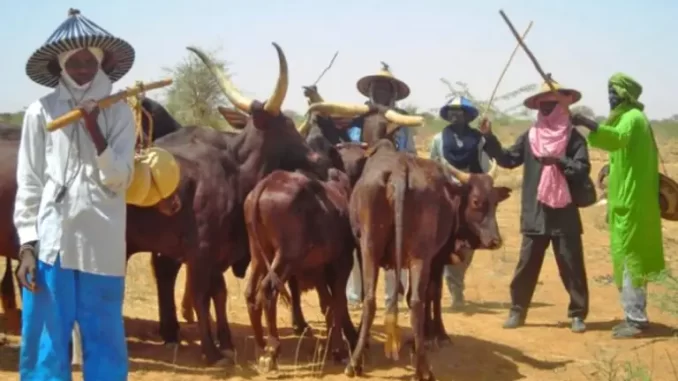
The Miyetti Allah Cattle Breeders Association of Nigeria (MACBAN) said it has formally written to the United States Congress, through the American embassy in Abuja, urging the lawmakers to withdraw the group’s name from a proposed sanctions list under the U.S. House Resolution 860, which targets entities accused of violating religious freedom in Nigeria.
Addressing a press conference on Sunday in Abuja, MACBAN president, Baba Othman Ngelzarma, rejected what he described as “misleading and incomplete assertions” contained in the resolution, insisting that MACBAN is a lawful socio-cultural and economic association, not a militia or violent organisation.
The group said the resolution’s claims blur the line between criminal elements operating in rural areas and law-abiding pastoralists who are themselves victims of worsening insecurity.
It emphasised that MACBAN, registered by the Federal Government in 1986, has no historical or organisational links to extremism and should not be equated with Fulani-ethnic militias listed in the bill.
The group’s reaction comes as U.S. lawmakers consider a bill sponsored by Congressman Christopher Smith, which proposes visa bans and asset freezes on individuals and organisations deemed responsible for severe violations of religious freedom under the International Religious Freedom Act.
The bill lists MACBAN, Miyetti Allah Kautal Hore, and “Fulani-Ethnic Militias” as Entities of Particular Concern, alongside globally sanctioned groups such as Boko Haram, ISIS-West Africa, the Taliban and the Houthis.
If passed, the bill would empower U.S. authorities to impose visa bans and asset freezes on individuals linked to the named entities.
The proposed sanctions form part of a broader U.S. initiative to address what Washington describes as violations of religious freedom in Nigeria.
President Donald Trump recently designated Nigeria a “country of particular concern” and instructed Congressman Riley Moore and House Appropriations Committee Chairman Tom Cole to investigate alleged attacks on Christian communities.
The Federal Government rejected the allegations, insisting that Nigeria’s Constitution guarantees freedom of worship. Despite this, Trump reportedly directed the U.S. Department of War to prepare for potential action.
Ngelzarma said MACBAN’s decades-long record of collaborating with security agencies, peace-building institutions, and international partners contradicts any suggestion of complicity in violence.
He cited partnerships with the Nigeria Police Force, Nigerian Armed Forces, NSCDC, NIPSS, state peace-building agencies, traditional rulers, as well as international organisations, including USAID, Mercy Corps, Search for Common Ground, and the Centre for Humanitarian Dialogue.
He said these collaborations have supported mediation efforts, early-warning systems, and the prevention of reprisals in conflict-prone communities.
He also mentioned the heavy losses suffered by pastoralists, saying verified records between 2015 and 2025 show that over 18,600 pastoralists were killed, more than 1.29 million displaced, 87,543 houses destroyed, and over one million cattle rustled or killed in 17 states.
He also listed several of MACBAN’s state chairmen and executives who were assassinated for cooperating with security agencies, stressing that these incidents underscore the community’s vulnerability rather than any involvement in violence.
MACBAN, therefore, appealed to the U.S. Congress to revise the resolution and remove its name, warning that mischaracterising pastoralists threatens ongoing peace-building efforts and risks deepening Nigeria’s rural insecurity.
The association also called for more evidence-based engagement with local actors and support for long-term solutions such as grazing reserves, rangeland restoration, veterinary services, education, and conflict-resolution programmes.
MACBAN said it “does not support, condone, harbour, finance, or protect any form of criminality,” adding that individuals who commit crimes do so independently and must face justice.
It urged the international community to recognise pastoralists as critical contributors to Nigeria’s food security rather than stereotype them based on the actions of criminal impersonators.
Leave a Reply